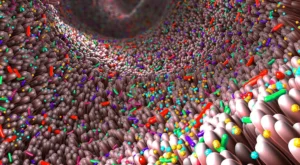Original Post Date: May 2, 2020
Postbiotic metabolites, bioactive compounds produced by beneficial microorganisms, such as gut bacteria, after they metabolize prebiotics or probiotic components, provide a wide range of health-regulating effects such as antioxidant activity, rebalancing the acid/base level, suppressing the growth of pathogens, strengthening the immune system, neutralizing toxins, improving the integrity of the intestinal lining and enhancing moods via gut-brain communication. In this article, I’m going to discuss an important postbiotic metabolite named butyrate and explain how it helps maintain the integrity of the intestinal barrier in the GI tract.
Epithelial Cells & The Gut Lining
The lining of the intestinal tract is a 1-cell-thick layer of cells, which are named epithelial cells. Epithelial cells have the highest rate of turnover of any cells in the body. Scientists estimate that intestinal cells are renewed every 5 to 7 days, which means that humans create an entirely new lining in their GI tract every 5 to 7 days.
It takes an enormous amount of energy for the body to renew these epithelial cells continually. Scientists estimate that about 10% of an individual’s daily energy requirements are utilized for the constant renewal epithelial cells. The energy required for the continuous production of these new cells is provided by a class of postbiotic metabolites called short-chain fatty acids (SCFAs), especially butyrate. Scientists now realize that the postbiotic metabolite butyrate is the primary energy source for epithelial cell renewal.
Bacterial imbalance or dysbiosis can cause irritation and damage to the cells that line the GI tract which can cause symptoms such as gas, bloating, diarrhea, pain. This damage hinders digestion and the absorption of nutrients and causes damage to the intestinal lining. Damage to the intestinal lining allows harmful substances to pass into systemic circulation, which increases risks to many other health problems. Consequently, efforts to correct dysbiosis and heal the lining of the GI tract involve stimulating and accelerating the process of generating healthy new epithelial cells to replace the old inflamed, damaged cells.
Dysbiosis reduces the number of butyrate-producing probiotic bacteria, which lowers butyrate production. Because butyrate is the primary energy source for the renewal of cells that line the intestinal tract, it plays an important role in the regulating the health of the intestinal tract.
Benefits of Butyrate
Butyrate helps maintain the health of the intestinal barrier in the GI tract. Butyrate also provides antioxidant activity, improves immune function, regulates gene expression and improves intestinal motility. In fact, it has been hypothesized that low levels of butyrate may be one of the causes of constipation.
Since butyrate is recognized as a very important postbiotic metabolite and adequate amounts of butyrate are critical for a healthy functioning intestinal tract, it is beneficial to know how to increase or optimize levels of butyrate in the GI tract.
How To Increase Butyrate Levels
Many foods contain small amounts of butyrate including fruits, vegetables, legumes, dairy products and fermented foods. However, I believe the two best ways to increase butyrate are the following:
- Increase your consumption of fiber-rich foods. Your innate probiotic bacteria will ferment the dietary fibers and produce butyrate along with numerous other important postbiotic metabolites.
- Take Dr. Ohhira’s Probiotics, which is produced in a multi-year fermentation process that results in the production of butyrate and many other postbiotic metabolites. In addition to directly supplying butyrate, the other postbiotic metabolites help improve the environment in the GI tract, which improves the ability of your probiotic bacteria to produce butyrate.
Also, the following drugs contribute to bacterial imbalance and low butyrate levels: antibiotics, acid-suppressing drugs (PPIs H2 Blockers & antacids), oral contraceptives, hormone replacement therapy (HRT), NSAIDs, steroids and many types of chemotherapy. Follow your doctor’s advice but be aware that the above-listed medications can disrupt your gut microbiome, which can lead to other health problems.
The benefits from Dr. Ohhira’s Probiotics are predominantly due to over 500 postbiotic metabolites that are produced during the natural 3-year fermentation process.




